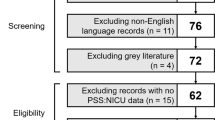Abstract
Objective:
The objective of this study was to evaluate the frequency, the intensity and the level of moral distress experienced by nurses working in neonatal intensive care units (NICUs).
Study Design:
We conducted a cross-sectional questionnaire survey involving 472 nurses working in 15 level III NICUs. Frequency, intensity and level of moral distress was evaluated using a modified version of Moral Distress Scale Neonatal–Pediatric Version. Socio-demographic data were also collected.
Result:
Four hundred six nurses completed the study material indicating a low-to-moderate experience of moral distress. The situations receiving the highest scores for frequency, intensity and level of moral distress related to the initiation of extensive life-saving actions and participation to the care of ventilator-dependent child. No difference in the mean scores of moral distress was found according to the socio-demographic characteristics investigated.
Conclusion:
The present study provides further insight into the moral distress experienced by nurses working in Italian NICUs.
This is a preview of subscription content, access via your institution
Access options
Subscribe to this journal
Receive 12 print issues and online access
$259.00 per year
only $21.58 per issue
Buy this article
- Purchase on Springer Link
- Instant access to full article PDF
Prices may be subject to local taxes which are calculated during checkout
Similar content being viewed by others
References
Iacovidou N, Varsami M, Syggellou A . Neonatal outcome of preterm delivery. Ann N Y Acad Sci 2010; 1205: 130–134.
Larroque B, Ancel P, Marret S, Marchand L, André M, Arnaud C et al. Neurodevelopmental disabilities and special care of 5-year-old children born before 33 weeks of gestation (the EPIPAGE study): a longitudinal cohort study. Lancet 2008; 371: 813–820.
De Kleine MJ, Den Ouden AL, Kolee LA, Van Baar A, Nijhuis-Van Der Sanden MW, Ilsen A et al. Outcome of perinatal care for very preterm infants at 5 years of age: a comparison between 1983 and 1993. Paediatr Perinat Epidemiol 2007; 21: 26–33.
Serenius F, Kallen K, Blennow M, Ewald U, Fellman V, Holmstrom G et al. Neurodevelopmental outcome in extremely preterm infants at 2.5 years after active perinatal care in Sweden. JAMA 2013; 309: 1810–1820.
Cavaliere TA, Daly B, Dowling D, Montgomery K . Moral distress in neonatal intensive care unit RNs. Adv Neonatal Care 2010; 10: 145–156.
Kain VJ . Moral distress and providing care to dying babies in neonatal nursing. Int J Palliat Nurs 2007; 13: 243–248.
Epstein EG . End-of-life experiences of nurses and physicians in the newborn intensive care unit. J Perinatol 2008; 28: 771–778.
Jameton A . Nursing Practice: the Ethical Issues. Prentice Hall: Englewood Cliffs, NJ, USA, 1984.
Jameton A . Dilemmas of moral distress: moral responsibility and nursing practice. AWHONNS Clin Issues Perinat Womens Health Nurs 1993; 4: 542–551.
Corley MC . Nurse moral distress: a proposed theory and research agenda. Nurs Ethics 2002; 9: 636–650.
Pendry PS . Moral distress: recognizing it to retain nurses. Nurs Econ 2007; 25: 217–221.
Rushton CH . Defining and addressing moral distress tools for critical care nursing leaders. AACN Adv Crit Care 2006; 17: 161–168.
McCarthy J, Deady R . Moral distress reconsidered. Nurs Ethics 2008; 15 (2): 254–262.
Ulrich C, O’Donnel P, Taylor C, Ferrar A, Danis M, Grady C . Ethical climate, ethics stress, and the job satisfaction of nurses and social workers in the United States. Soc Sci Med 2007; 65: 1708–1719.
Gutierrez KM . Critical care nurses’ perceptions of and responses to moral di stress. Dimens Crit Care Nurs 2005; 24: 229–241.
Corley CM, Elswick RK, Gorman M, Clor T . Development and evaluation of a moral distress scale. J Adv Nurs 2001; 33: 250–256.
Corley MC, Minick P, Elswick RK, Jacobs M . Nurse moral distress and ethical work environment. Nurs Ethics 2005; 12: 381–390.
Epstein EG, Hamric AB . Moral distress, moral residue, and the crescendo effect. J Clin Ethics 2009; 20: 330–342.
Zuzelo PR . Exploring the moral distress of registered nurses. Nurs Ethics 2007; 14: 344–359.
Yam B MC, Rossiter JC, Cheung KY . Caring for dying infants: experiences of neonatal intensive care nurses in Hong Kong. J Clin Nurs 2001; 10: 651–659.
Janvier A, Nadeau S, Deschenes M, Couture E, Barrington KJ . Moral distress in the neonatal intensive care unit: caregiver’s experience. J Perinatol 2007; 27: 203–208.
Hamric AB, Borchers TC, Epstein EG . Development and testing of an instrument to measure moral distress in health care professionals. AJOB Prim Res 2012; 3: 1–9.
Webster GC, Baylis FE . Moral residue In: Rubin SB, Zoloth L (ed). Margin of Error: the Ethics of Mistakes in the Practice of Medicine. University Publishing Group: Hagerstown, MD, USA, 2000, pp 217–230.
Hanna DR . Moral distress: the state of the science. Res Theory Nurs Pract 2004; 18: 73–93.
Acknowledgements
We gratefully acknowledge Professor Mary C Corley and Professor Amric for their encouragement and advice in the conduct of this study. This research received no specific grant from any funding agency in the public, commercial or no-profit sectors.
Author information
Authors and Affiliations
Corresponding author
Ethics declarations
Competing interests
The authors declare no conflict of interest.
Rights and permissions
About this article
Cite this article
Sannino, P., Giannì, M., Re, L. et al. Moral distress in the neonatal intensive care unit: an Italian study. J Perinatol 35, 214–217 (2015). https://doi.org/10.1038/jp.2014.182
Received:
Accepted:
Published:
Issue Date:
DOI: https://doi.org/10.1038/jp.2014.182
This article is cited by
-
Psychometrics of the moral distress scale in Iranian mental health nurses
BMC Nursing (2021)



